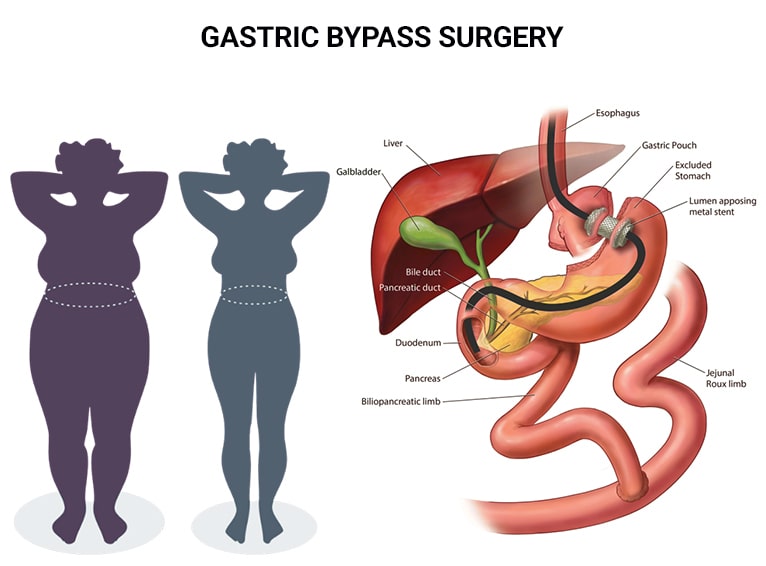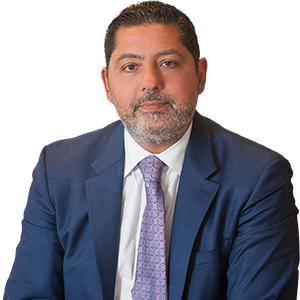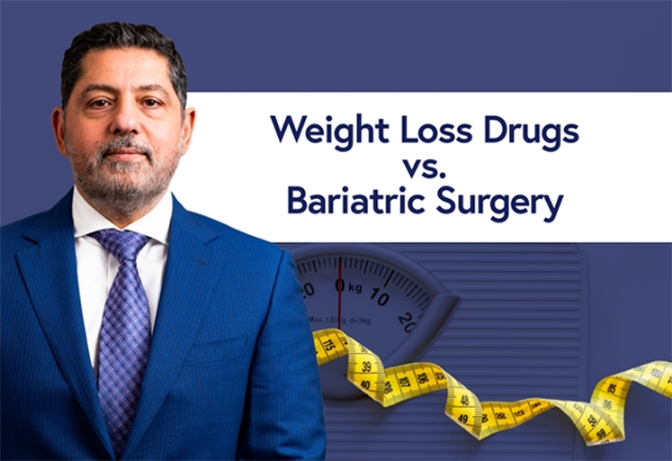Weight Loss Drugs vs. Bariatric Surgery – Which is Right For You?
If you’re trying to lose weight and finding it difficult, you may have considered taking medications or undergoing bariatric surgery. Both of these... read more
Call Us Today (732) 640-5316
E-Waiting RoomAfter you have tried countless diets, joined a few gyms or even visited medical weight loss providers, you may be ready to consider other options to achieve more significant results. Turn to the weight loss surgeons at Advanced Surgical & Bariatrics for advice on how you can successfully reach your weight loss goals.
Gastric bypass surgery, considered the gold standard of bariatric treatments, is a safe and effective form of surgery that results in drastic weight loss. Even more meaningful, you can expect healthier outcomes for any underlying conditions you may have, such as high blood pressure, reduced activity levels, low energy, sleep disorders, back pain and cardiovascular disease. Contact our expert weight loss doctors today to find out how you can finally take control of your weight and, most importantly, your health.
Our bariatric surgery center offers the best and safest options in surgical and non-surgical weight loss in the Tri-State area. Meet the region’s top gastric bypass doctors and best in class bariatric surgeons, who are nationally recognized for their track record of success. Place your care in the hands of bariatric experts who always treat you with compassion and respect.
Gastric bypass surgery involves two steps. Your bariatric surgeon first divides your stomach into two sections. The top part is known as the gastric pouch- this is the only part of the stomach where food passes. Since the pouch can only hold a small amount of food, you won’t be able to eat as much so you get that full feeling sooner. The bottom portion of the stomach does not hold food, but still functions in producing chemicals needed in digestion. The second part of the surgery is the bypass, where your bariatric surgeon connects the gastric pouch to part of your small intestine. After this procedure, the food you eat passes through the new pouch, bypassing part of your stomach and the first section of your intestines. This reduces your body’s ability to absorb calories.
Gastric bypass surgery is done laparoscopically using five small incisions and requires general anesthesia. The surgery typically takes one to two hours to perform. The hospital stay is usually one to four days, depending on your overall health and reaction to the procedure. You should be able to return to work in about one week.

Recovery time is moderate. Most patients are able to leave the hospital within a day or two and return to normal activity levels in less than a month. Almost all gastric bypass patients return to work in about a week depending on job responsibilities.
Gastric bypass patients typically lose over 80 percent of their excess weight, and most patients report that Type 2 Diabetes, high blood pressure and cholesterol have been improved or resolved.
The staff has been nothing but friendly throughout this experience. I’m grateful for their time and attention in the weeks leading up to my surgery. I recommend this office for anyone looking to have a gastric bypass surgery.
Lisa B.There is always some degree of risk or complication with any type of procedure, and bariatric surgery is no exception. Although exceedingly rare, the possible risks of gastric bypass procedure include:
As a result of the bypass, the bottom portion of the stomach and proximal parts of the small intestine cannot be seen easily using conventional imaging or endoscopy. Patients undergo a preoperative endoscopy to ensure safety during and after gastric bypass surgery.
By following the recommendations that your physician provides, you will dramatically reduce the risk of complications. With a gastric bypass, patients should take a daily multivitamin, which may also include supplemental calcium, B complex vitamins or iron. Nutritional labs are drawn on a regular basis to ensure that deficiencies do not occur.
Due to their vast experience and expertise, the team at Advanced Surgical and Bariatrics not only have a strong commitment to quality care, but also emphasize extensive after-care, thereby further reducing your risks. Your bariatric specialist will discuss your concerns and answer any questions at every patient-doctor interaction.
As a whole, gastric bypass is a safe procedure that supports you to lose excess weight and attain your long-term health goals. In fact, our safety track record is among the highest in the nation. You can place your utmost trust in the surgical team at Advanced Surgical and Bariatrics because they are among the best in the country.
The two most common types of bariatric surgery are the gastric sleeve and gastric bypass. Both surgical procedures involve restricting the volume of the stomach, which effectively reduces the amount of food that you are able to eat at one sitting. The laparoscopic gastric bypass has the additional benefit of allowing for a digestive system that is less efficient in calorie absorption. In any case, both procedures can be effective in helping you achieve long-term weight loss and to improve, or even resolve, obesity-related conditions such as high blood pressure, high cholesterol, gastroesophageal reflux disease (GERD), obstructive sleep apnea or type 2 diabetes.
If you’re comparing the gastric bypass to the sleeve, gastric sleeve is a shorter surgery that has a lower risk of complications. The gastric sleeve is more suited for people whose weight is primarily driven by large portion sizes or a high hunger drive. People with a strong “sweet tooth”, severe diabetes, difficult to control underactive thyroid function, or postmenopausal women tend to have better results with a gastric bypass.
There is no “one-size fits all” surgery. The recommended procedure involves a tailored approach that takes into account age, gender, weight related medical conditions, previous abdominal surgeries, weight loss goals, and typical eating habits. We take all these factors into consideration, so that you can make an informed decision and ultimately find what you are looking for after surgery.
When looking for an effective cure for obesity, choose the right weight loss doctor offering gastric bypass surgery with a special emphasis on safety and excellence to improve postoperative outcomes and decrease the length of hospital stay, postoperative pain, and complications. Your team of interdisciplinary specialists at Advanced Surgical and Bariatrics offer an exceptional long-term resolution of obesity and the very real potential of full reversibility of related medical issues- all by using the least invasive approach. We are here to support your success in losing weight and addressing obesity-related health problems.
Contact our top bariatric doctors in New Jersey today for more information about the gastric bypass, gastric sleeve, or other alternative weight loss procedures to reclaim your health.
Choosing bariatric surgery is a very personal decision. In doing so, you are making a life changing and even life saving choice. Consideration involves not only surgery, but also adopting new lifestyle habits.
Why choose Advanced Surgical and Bariatrics?
The specialists at Advanced Surgical and Bariatrics are board certified and fellowship trained bariatric surgeons. This means your surgeon has the extensive specialty training, skills and experience to provide superior care.
At Advanced Surgical and Bariatrics, our surgeons have extensive surgical expertise and technical proficiency. We perform thousands of minimally invasive bariatric surgery procedures every year and our complication rates are among the lowest in the Northeast.
You want a surgeon who listens to your concerns, answers your questions, provides the information you need to make decisions, and respects your preferences.
When you choose Advanced Surgical and Bariatrics of NJ, you will receive collaborative comprehensive treatment including medical management, psychosocial support, exercise/ fitness guidance, and nutrition counseling. You will work with a team of professionals to develop a personalized care plan that includes education and evaluation before surgery, as well as lifetime follow-up care to support you keep the weight off and stay healthy.
Our surgical center has been designated as a Bariatric and Metabolic Center of Excellence from the American Society for Metabolic and Bariatric Surgery.
The center at Advanced Surgical and Bariatrics is one of the seven programs in the country to have earned The Joint Commission’s Gold Seal of Approval for its Bariatric Surgery Program by demonstrating compliance with national standards for health care quality and safety in disease-specific care.
Advanced Surgical and Bariatrics of NJ has earned distinction as a Center of Excellence in Pediatric and Adolescent Bariatric surgery by the Surgical Review Corporation- a nonprofit, patient safety organization that develops and administers best-in-class accreditation programs throughout the world.
The insurance specialists and patient navigators at the offices of Advanced Surgical and Bariatrics allow for streamlined support in collaborating with your insurance plan.
Dr. Sadek was chosen as a Top Doctor in Jersey Choice 2014-2020 based on the opinion of his physician peers across a range of disciplines.
At Advanced Surgical and Bariatrics of NJ you can feel confident you are receiving the best care available. Our team of elite surgeons is knowledgeable, attentive and thorough, kind, compassionate, and professional. You will get your questions answered and receive personalized care and respect in a private, comforting, and compassionate environment.
Healthgrades.com consumer reviews give Advanced Surgical and Bariatrics of NJ 5 stars with about 400 reviews. Patients report confidence in every step of the process. Patients say that Dr. Sadek and his team of skilled surgeons are knowledgeable, attentive, thorough, kind, compassionate, and professional throughout the entire process. Patients consistently remark that the care they have received from Advanced Surgical and Bariatrics has changed and, in some cases, saved their lives.
Many patients commented that their only regret was not doing the gastric bypass sooner because they feel amazing!
Contact us to schedule a consultation and take your first step toward a new beginning.
Advanced Surgical & Bariatrics of NJ bariatric clinic is a pioneer in enhanced recovery protocols that allow patients to resume their lives more quickly after surgery. Enhanced recovery protocols are a paradigm shift that substantially improves outcomes.
ERAS is evidence-based care that requires a team of bariatric surgery doctors, anesthesiologists and an ERAS coordinator.
An enhanced recovery protocol:
The benefits of ERAS are reduced hospital stays and lower readmission rates. The goal is to discharge the patient as soon as they reach functional recovery. Multimodal postoperative pain management reduces the use of narcotics by almost 74%.
Optimizing the gastric bypass surgery postoperative period with ERAS is a major benefit to patients. Early recovery of gastrointestinal function significantly contributes to decreased discomfort and shorter hospital stays, without increasing risk or significant complications. The ERAS protocol also reduces the profound stress response after gastric bypass surgery.
Studies report that the use of ERAS protocol has led to significantly more gastric bypass patients being discharged from the hospital within 48 hours after surgery.
High quality post-operative care improves outcomes. ERAS protocols are safe and efficient for enhanced recovery after bariatric weight loss procedure.
Pain. In case it is needed, you will receive a prescription for pain medication. Most patients report that the pain in the first couple of days can be managed with over-the-counter medication.
Hydration & Food. It is important to stay hydrated by sipping throughout the day despite not being thirsty. For the first two weeks, you remain on a liquid diet. A gradual reintroduction of increasingly more complex textures, such as pureed followed by soft food, occurs postoperatively. Ultimately, small amounts of regular solid food are incorporated approximately four weeks after surgery. Your bariatric surgeon and nutritionist will recommend different types of stage appropriate food items as you advance your diet.
Being mindful of your pacing and portion sizes when you drink and eat will allow you to more comfortably understand how much fluid and food your stomach can hold.
Blood Pressure and Blood Sugar. If you have diabetes it is important to check your blood sugar regularly, as you do not want to become hypoglycemic. If you have hypertension, it is important to routinely check your blood pressure. Your primary care provider, cardiologist or endocrinologist will be involved in adjusting your medication regimen.
Fatigue. You may initially feel fatigued because your body is not yet used to the limited caloric intake. Also remember that you are recovering from surgery as well as general anesthesia.
Showering and caring for your incisions. Before leaving the hospital, you will receive instructions on how to care for your incisions. You may shower when you return home from the hospital.
The best advice is to follow your surgeon’s instructions, including following your diet plan, staying hydrated, resting, walking several times a day and listening to your body. Take your time climbing stairs. You will be tired while adjusting to your restricted diet. One week after surgery, you will have your scheduled visit with your surgeon at Advanced Surgical & Bariatrics, at which point you will likely be given the approval for light exercise. Permission for heavy exercise is usually given at the one month postoperative visit. Combining a healthy diet with exercise will help you experience long-term success.
Most people who primarily work behind a desk, take one, maybe two weeks off from work. For more physically demanding jobs, it is recommended to take off about a month.
Dr. Ragui Sadek is dedicated to the success of his patients both preoperatively and postoperatively. This dedication to quality includes treating patients as family members- with respect, compassion, dignity and love. Advanced Surgical & Bariatrics has one of the lowest complication rates in the country. With offices throughout New Jersey, all patients receive state-of-the-art care with cutting edge techniques. When you are ready, we are here for you to realize a new beginning.
There are many different factors involved in deciding if gastric bypass surgery is right for you. Cost is one such factor. Gastric bypass or gastric bypass revision costs vary depending on the qualifications of the surgeons, insurance coverage and more.
For a person without bariatric coverage, the average out of pocket cost of a gastric bypass surgery in the US ranges between $18,000 and $35,000. These costs generally include:
Advanced Surgical & Bariatrics has been voted the #1 Bariatric Surgery Center in New Jersey by U.S. News & World Report. In this article, our board-certified bariatric surgeons explain the varying factors that affect the costs of gastric bypass surgery.
At Advanced Surgical & Bariatrics our goal is to provide you with all the information you need to make an informed decision about surgery. While cost is a major consideration, the most important is choosing the best and most qualified surgeon.
*Studies report that obese adults spend 42% more on direct medical expenses than adults at a healthy weight. This amounts to an increased annual cost $4,789.00 for an obese woman, and $2,646.00 for obese men. Obesity greatly increases the severity of health conditions and therefore cost of health care, including longer hospital stays, and higher treatment charges.
Adults struggling with obesity face numerous health risks including:
Non-medical costs include an increased risk of premature death, lower quality of life, higher fuel costs, higher funeral costs, and higher travel costs to name a few.
The cost of doing nothing is much greater than the financial and personal costs of obesity. Bariatric surgery will improve not only your personal mental and physical health, but also that of your family. You can feel confident in your decision to have the experts at Advanced Surgical and Bariatrics support you in taking charge of your health.
Most major insurance companies will pay for your weight loss surgery if you meet certain requirements. Coverage depends on your specific healthcare plan.
The insurance specialists and patient navigators at the offices of Advanced Surgical and Bariatrics allow for streamlined support in collaborating with your insurance plan. Our dedicated staff to help you obtain authorization for the procedure.
If you don’t have bariatric coverage, Advanced Surgical & Bariatrics provides flexible payment options including financing, medical loans and more.
Take control of your life. Contact Advanced Surgical & Bariatrics to discover the life-changing benefits of bariatric surgery. We have offices throughout New Jersey and are here to help welcome the healthier you.
*Stop Obesity Alliance Fast Facts, School of Public Health & Health Services, The George Washington University. www.stopobesityalliance.org.
The gastric bypass is considered the gold standard of bariatric surgery. This minimally invasive procedure reduces the size of the stomach and modifies how you absorb food. The small stomach pouch limits the amount of food that can be consumed. In addition to the decreased ability to absorb calories, the small intestine part of the operation addresses chemical signals to suppress hunger and improve fullness. These biochemical changes improve how the body uses glucose, which results in rapid improvement of diabetes even before a significant amount of weight loss occurs.
Below are the most frequently asked questions patients direct to our board-certified bariatric surgeons at Advanced Surgical & Bariatrics about the Gastric Bypass.
Gastric bypass and other bariatric surgeries are major life-changing procedures that can reduce the burden of or risk of developing obesity related health problems like type 2 diabetes, high blood pressure, heart disease and sleep apnea. People who find it impossible to curb their intake of concentrated sweets, have poorly controlled type 2 diabetes, severe hypothyroidism or bad acid reflux, as well as postmenopausal women tend to do better with a gastric bypass.
In general, gastric bypass or another weight-loss surgery could be an option for you if:
In some cases, a person with a BMI of 30 may be approved for bariatric surgery.
An extensive screening process takes place at one of our offices throughout New Jersey to see if you meet certain medical guidelines to qualify for weight-loss surgery
The amount of weight you will lose depends on a number of factors, which include diet, exercise, lifestyle, and your overall commitment to changing old habits. On average, anywhere between 70 to 80 percent of the extra body weight is lost when all is said and done.
Compared to other weight loss surgeries, gastric bypass offers:
Gastric bypass surgery is done laparoscopically. These small incisions make for a shorter recovery time. Most people stay in the hospital for one day, and get back to unrestricted normal activities in about 1 month. It is common to take a week off from work for jobs that are not physically demanding.
People with a gastric bypass should take multivitamins with supplemental calcium, iron and B-complex vitamins. Bloodwork is routinely performed to assess nutritional status.
Gastric bypass can reduce the risk of death by 40 percent over a seven-year period, according to a 2007 study in the New England Journal of Medicine. They found that people who underwent gastric bypass surgery had a 40 percent reduction in the rate of death compared to their obese counterparts.
In a few instances, managing hunger may be challenging after having a gastric bypass. Some patients may still feel hungry even if they are full after eating. This arises because the brain may still be used to the patient’s past lifestyle and diet. As you continue to adopt mindful healthy eating habits, your appetite typically responds accordingly.
Read more: Gastric Bypass Surgery FAQs

Dr. Ragui Sadek is a premier surgeon who established a state-of-the-art and one of the safest bariatric surgery programs in the state. Dr. Sadek has fellowship training in both laparoscopic/bariatric surgery and surgical trauma/critical care, allowing him to safely perform complex surgeries on patients who have been turned down by other practices. As a Clinical Assistant Professor of surgery at RWJ Medical School & the Director of bariatric surgery program at RWJ University Hospital, Dr. Sadek offers a cutting-edge range of laparoscopic, robotic, & bariatric surgical procedures with a complication rate substantially below the national average.
Dr. Sadek is a Clinical Assistant Professor of Surgery at Rutgers-Robert Wood Johnson Medical School and a Fellow of the American College of Surgeons. Having performed more than three thousand advanced surgical procedures, Dr. Sadek has established a strong patient satisfaction rate and a solid reputation among the surgical community and is renowned as a top physician in his field by International Association of Healthcare Professionals. As a board-certified surgeon, he holds affiliations with the American Society of Metabolic and Bariatric Surgery and the Society of American Gastro Endoscopic Surgeons. More about Dr. Sadek
Stay current with Advanced Surgical & Bariatrics of New Jersey

If you’re trying to lose weight and finding it difficult, you may have considered taking medications or undergoing bariatric surgery. Both of these... read more

Are you frustrated with your inability to lose weight? Tired of being trapped in an endless cycle of yo-yo dieting, over-exercising, cleanses, and... read more